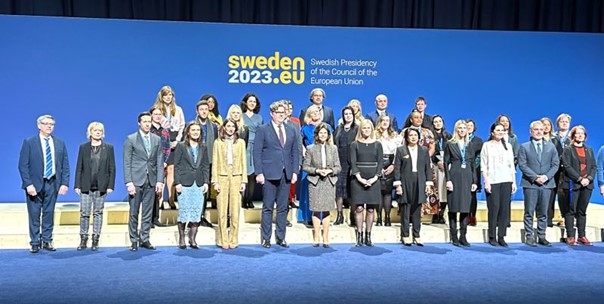
As part of Sweden’s presidency in the EU, a two-day conference on human trafficking was held on March 29-30, focusing on addressing the demand that drives exploitation.
The conference brought together European ministers, delegates, experts from civil society, representatives from international organizations, and survivors to discuss models that can be used to prevent human trafficking and prostitution, as well as to eliminate demand. As a member of the EU Civil Society Platform, the Secretary General of RealStars participated in the event.
Overall, the conference was a refreshing inclusion, as these types of international gatherings often avoid the necessary conversations about demand, despite this focus being an international legal obligation and a crucial strategy for combating human trafficking.
Sweden’s position was to showcase the Nordic model, or “The Equality Model” as it is now called, as the most suitable model for reducing sexual exploitation and the harm inflicted on vulnerable individuals. The model entails that the sex purchase law criminalizes the buyer but not the victim.
Among the many panels during the days, there were opportunities to gain insights, evidence and knowledge regarding various models to counter demand, such as the French and Irish variants of the sex purchase law. Legislation in countries that allow so-called “voluntary” prostitution was also discussed, along with the issues related to such laws. For example, Germany was introduced with regulated prostitution, where sex purchasing and pimping are permitted, and Cyprus, which prohibits forced prostitution and organized forms such as pimping.
The EU proposal regarding the anti-trafficking directive to criminalize “knowing use of ‘services’ from victims of human trafficking” was not unexpectedly one of the key issues during the panels. Most agreed that it is a toothless proposal that will not reduce demand for sex purchases, something we are seeing in Germany and Finland, which are two countries that already have this solution. There, it has proven incredibly difficult to demonstrate that the perpetrator was aware of their exploitation. Another consequence is that “knowing use” does not create the necessary incentives for the police to prioritize intervening against individuals being exploited in prostitution and human trafficking. However, we see that a sex purchase law is an effective tool for police to intervene in prostitution and also address human trafficking.
Here are two telling quotes that illustrate the problems when the act of purchasing sex is not prohibited:
“To be honest, I was aware of the violence the women were subjected to; I just didn’t think about it at that moment” – Sex buyer
“Prostitute-users are typically incapable of distinguishing and/or unmotivated to differentiate between prostituted persons who have been subjected to the illicit means delineated in article 3 (a) of the Protocol and those who have not” – UN Special Rapporteur on Trafficking in Persons (2014).
It seems that the conference became a bright moment to elevate political will and demonstrate concrete measures to combat demand. It serves as an appeal to leverage legal commitments such as Article 18 in the EU directive and the UN Palermo Protocol. Hopefully, it can sharpen the ongoing negotiations within the EU to adopt a revised directive against human trafficking and a new directive addressing men’s violence against women. We hope that Sweden, as the leader of the negotiations, will do its utmost to ensure that EU member states agree to combat demand for prostitution with a clearer framework.
The reality of prostitution must be made visible in the directives, and all those responsible for sexual exploitation must be held accountable, including the sex buyer. The act constitutes violence against women.
And to quote HM Queen Silvia when she opened the conference, she concluded her speech by saying that we should let children who have suffered sexual exploitation and victims of human trafficking understand that we believe them, protect them, and not the perpetrators. And, even more importantly, that we act and do so in collaboration.
The conference featured many more highlights, and you can watch it here.


